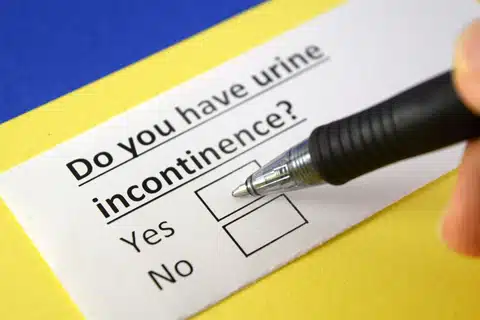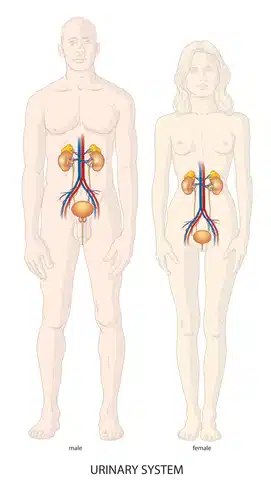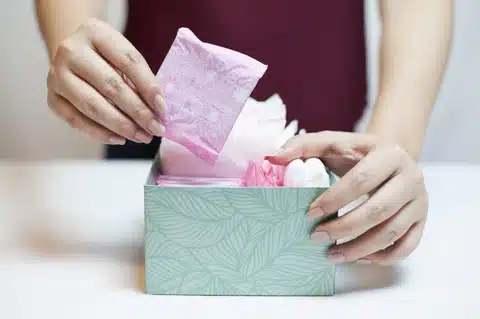Incontinence is already a topic women don’t like to discuss, especially younger women. So the topic of incontinence before, during, and/or after a period is almost completely unspoken. But for many women, regardless of age, incontinence during the menstrual cycle does occur. For some women it occurs the week before. For others it is during their period. And for some it is after their period.
Unfortunately, there is little research into why some women experience incontinence as part of their menstrual cycle. But we do have some studies to draw on. These studies show that about 41% of women experience cyclical incontinence. And of those women, 42% notice symptoms before their period, and 36% noticed increased symptoms during their period. Today we’re going to discuss whether or not incontinence after your period is normal.

What is Urinary Incontinence?
There is a wide range of hormones that governs the menstrual cycles. And these hormones have been blamed for a number of conditions throughout the years. This includes urinary incontinence. Urinary incontinence takes many forms, including:
Stress incontinence – this is when you leak after sneezing, coughing, laughing, jumping, etc.
Urge incontinence – this is the sudden need or desire to urinate that you can’t hold in.
Mixed incontinence – where you experience both stress and urge incontinence.
While early theories centred on the idea of hormones like estrogen and progesterone, this opinion is beginning to change.

Is There a Link Between the Menstrual Cycle and Incontinence?
As mentioned before, some recent studies have looked at women and their ability to hold urine during their period. Around 42% of the women studied experienced slight bladder control issues just before their period. About 36% had the same, slight, loss of control during their periods. The number was even smaller for those who lost control after their period or mid-cycle.
A secondary study looked at the relationship between your period and urinary incontinence. These researchers found no correlation at all between your period and urinary incontinence. It did, however, find a slight increase in urinary incontinence around the time of ovulation. So what does cause urinary incontinence?

What Causes Urinary Incontinence?
There are many reasons why you might be experiencing urinary. It could be from temporary factors like medication that influences your bladder activity. In this case, it’s best to discuss your medication/s with your doctor. Constipation can also cause you to leak urine because the bladder and the rectum are so close.
Diet is also a factor in incontinence. Alcohol and caffeine are diuretics, which make you need to urinate more. Some foods can also be bladder irritants. We have discussed this more in depth here.
Neuromuscular disorders can also cause urinary incontinence. This means there may be an issues with the function of nerves that link the bladder with the brain. Neuromuscular disorders require physical therapy to remap the nerve connections to the brain. There are also pelvic floor disorders, caused by the weakening of the floor of the pelvis. Physical therapy can also help you strengthen your pelvic floor to help control urinary incontinence. You could also be suffering from pelvic organ prolapse, bowel leakage, issues with your anatomical structure, or bladder or kidney stones. This is why it is important to discuss your concerns with your doctor or gynaecologist.

Urinary Incontinence When Using Period Products
Some women might experience urinary incontinence when using certain period products, like tampons and menstrual cups. When inserting a tampon or a menstrual cup, we are basically altering the intra-abdominal pressure or IAP. By altering the IAP, we alter our body’s ability to properly adapt to the environment. This can be cause by either tight (hypertonic) muscles that are unable to properly relax and, as a result, unable to create a strong contraction because it is always in a state of contraction. Or it can be in a reduced tone (hypotonic) state, that prevents the body making a contraction at all.
If you are leaking only when using a tampon or cup, this may be a sign of bladder prolapse, masking stress urinary incontinence. Known as a cystocele, this type of prolapse can cause the urethra to kink and actually block the flow of urine. As a result, when using a tampon or cup, it acts as a pessary to reduce this kink and allow the proper flow of urine. If you notice increased incontinence when using a tampon or menstrual cup, it is best to speak to your doctor or gynaecologist.

What Can I Do About Incontinence After My Period?
If you are struggling with incontinence it is important that you talk to your doctor and/or your gynaecologist. They will work with you to help figure out the cause and start a treatment, exercise, diet or medication plan. This will be based on your medical history, medications, and a proper examination. Your treatment may include working with a physical therapist to remap nerve connections to the brain, as well as strengthening the pelvic floor. But it is important that you always see a doctor when you a notice a change in your period or continence.
If you need help managing your incontinence while working with your specialists, explore the Holistic Incontinence range today. We have a wide range of products to cover all levels of severity, without showing through your clothes. We also have pads to protect your furniture and bedding, as well as sanitising sprays and other skincare products to ensure you protect yourself from infections and bacteria caused by incontinence.
Contact our friendly Holistic Incontinence staff today for help and advice on choosing the right products for your needs.
